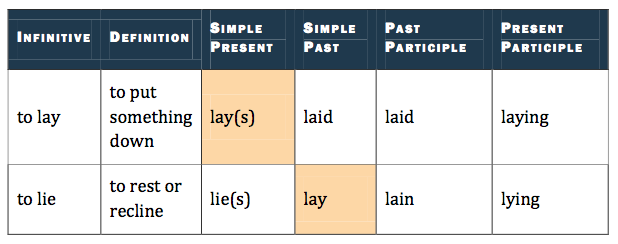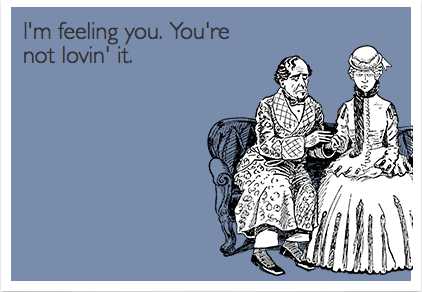It’s time for more Common Editing Mistakes from indie book editor Cate Baum!
1. Thru/through used randomly

2. “An” and “a” before vowel-beginning nouns
It might seem like “an” needs to go before all a-e-i-o-u words. But the rule is that it’s how a word sounds, and not how it is written. Try this: An unicorn. An universe. See how that sounds wrong? But “an apple” sounds correct, as does “an hour”, which is not even spelled with a vowel, but sounds like it is.
If it doubt, sound it out.
3. Capitalizing s/he after dialogue
If a piece of dialogue is followed directly by an action, it is allowed to treat it as a new sentence,
“I’ll call him later.” She walked to the bedroom.
However, if it is,
“I’ll call him later,” she said, as she walked to the bedroom.
it has to be treated as one sentence, and s/he said is never capitalized, and the dialogue should be finished with a comma and not a period. Dialogue does not a sentence make!
4. Writing Times, Obsessing About Times…
When you write morning and evening times, you must use a period after each letter: a.m./p.m. or A.M./P.M.
So
7am or 9pm
Should be:
7 a.m. or 9 P.M. You can also use PM.
This is because a.m. and p.m. are short for Ante Meridiem and Post Meridiem.
Bear in mind in other countries this form is not used, so simply saying “in the afternoon” or “in the morning” is better if you plan to have your book translated. Don’t say “12 a.m./p.m.” either – it’s far more acceptable to say “midnight”,”midday” or “noon.”
I often see times stated in this military fashion in prose. It’s really unecessary. Ask yourself, does my reader really need to know it is 7.03 p.m.? Or is that just for my timeline reference while I write my book?

Is your book obsessed with giving times of day
I go about deleting p.m. and a.m. like nobody’s business in most books. If the characters are going on a dinner date at 5, we can assume I hope, they are meeting at 5 p.m.! Do we need to know the time at all? It just makes a book seem like a military, OCD, operation, as in this excerpt:
Chapter Three – Monday, 15 April, 7.04 p.m.
We went for a drive for a couple of hours, and then at 9.34 p.m. we caught the train. Two hours later, we got to Rome and had dinner at 12.03 a.m.
Writing decades as numbers
- In writing, it is not necessary to use capitals: the eighties, the nineties
- You do not need an apostrophe with full years written in numbers: 1950s, 1960s
- You need an open apostrophe when writing abbreviated numbers: ’50s, ’60s. Note this means the apostrophe is curling under to the left, so on a computer type two single apostrophes, and delete the first one.
5. Lie and Lay

lay/lie table from chompchomp.com
“To lie” is to lie down, or to tell a lie. “To lay” is a different verb, to mean “to set out things.”
In the past, the verb “to lie” in the sense of lying on a bed, is ” she lay down.”
You cannot write, “She lied on a bed.” This sentence would mean that she told a lie while sitting on the bed.
To tell a lie, in the past, is “he lied.”
Confusingly, you cannot say “She lays on the bed.” What does she lay on the bed?
“She lays ten new dresses on the bed. “
The past of “to lay” is “laid.”
“She laid the table.”
Confused? Here’s a handy PDF from ChompChomp to explain in full.
6. Who and Whom
“Whom” should only be used when the people spoken about in the first part of the sentence become the subject of the sentence.
if it’s “him” or “her,” or “them” use “whom.”
The women, two of whom are married, like to walk every Sunday. Two of them are married.
If it’s “he” or “she,” or “they” then use “who:”
The women, who like walking, go out every Sunday. They like walking.
- Every verb with a tense must have a subject. So then use “who.”
“I wanted to punch whoever looked like they deserved it most.” They are the subject of the verb “to look like,” hence “whoever.”When the verb is not with the subject, but to/from them, use “whom:”
“I wanted to punch whomever I could get to first. You want to punch them.
7. Onto and On To
Onto and on to are two different meanings, but often get muddled.
“If you are climbing onto a roof, and then going on to a club, you might want to get on to your friends, but they might be onto a good thing and have tickets for that party you’ve been meaning to see if anyone would catch on to it. This would mean turning onto the highway at the 5.”
- Onto – physically getting on top of something, or figurately getting on top of an issue, or positioning yourself on the surface of.
- On to – to go on to something in time.

Despite Justin Timberlake’s song, “I’m loving it” is not correct English. An action verb requires action, and “to love” is not an action verb. Neither is “to like,” “to hate” or “to feel.”
In English, we can only say “I love this.” That is because a feeling like love is not an action we do on and off. We love chocolate, and we love a play at the theater. We like flowers, and we are feeling blue. We are not “feeling you.”
These forms are for regional slang (colloquial) US dialogue only, sometimes picked up by younger people in UK cities, and should only be used if you want to pepper your narrative with regional voice. They are not used outside of certain areas of the USA and do not work at all in literature outside of voicing a character.
NON ACTION VERBS
| ABSTRACT | be, believe,know, need, understand, remember, think, imagine, forget, mean, exist |
| FEELINGS | like, dislike, love, hate, fear, envy, care |
| SENSES | hear, see, feel, smell, taste, sound, seem |
| BELONGINGS | own, have, belong, possess |
Here’s some colloquial dialogue from a gritty urban thriller:
“I am lovin’ your place, bro!” said Jesse, looking around Rabbit’s digs.
“Yeah, I’m feeling it too,” said Maze, as he pulled on his cigarette and turned on the radio.
“Thanks, man, I’m seemin’ lucky today,” Rabbit said.
Let’s write that as an English cozy mystery using the nouns properly conjugated:
“I love your place, darling!” said Jessica, looking around Reverend Rabbit’s bungalow.
“Yes, I feel that way too,” said Detective Maze, as he pulled on his cigarette and turned on the radio.
“Thanks, old chap, I seem lucky today!” Reverend Rabbit said.
For giggles, let’s mix that up:
“I am lovin’ your place, bro!” said Jessica, looking around Reverend Rabbit’s bungalow.
“Yeah, I’m feeling it too,” said Detective Maze, as he pulled on his cigarette and turned on the radio.
“Thanks, man, I’m seemin’ lucky today,” Reverend Rabbit said.
I rest my case.
9. Dis -, Mis-, Im- and Un – (Four of the most misunderstood)
Getting these mixed up seems quite common.
un-
This is the opposite of the word without the prefix:
Uninterested – Not interested
Uninformed – Not informed
mis-
The prefix mis means wrong.
Misinformed – Told the wrong information
Misinterpreted – Interpreted incorrectly
Misued – Used in the wrong way
dis-
Dis means “not” in the sense of “outside of”, or intentionally not. These also often start with a vowel.
Therefore,
Disinterested – indifferent, not not interested.
Disengaged – not engaged by the action of unengaging
Disconnected – not connected by the action of not being connected
Disinformation – Intentionally unrelated or incorrect information – incorrect by the action of being wrong
im-
The prefix im means not, but integrally as part of the state of that word’s meaning becoming rather more powerful than just the negative of the word itself. They always start with “p” or “m.”
Impossible – meaning not possible but in its own sense, i.e. means cannot be done at all. “Impossible” suggests a superlative, more than “not possible.”
Impregnable – Cannot be penetrated. Gives a sense of being more than just not being pregnable.

Yes, this one is rife. Mostly among Americans, it seems, from my experience of working with writers around the world.
Colombia is the country, while Columbia is the film studio, the record label, the district and the goddess of democracy, as well as the explorer Christopher Columbus, no doubt the reason for the confusion that Colombia, named for him, is actually spelled with an “o” despite his name.
Confusingly still, the phrases “Columbian Conquests” or “Pre-Columbian Era” refer to Columbus’s conquests of America, and not the country, and these conquests and the era discussed includes Colombia.
But there are many books out there with erroneous “Columbian gang members” and “Columbian marching powder.” Even the most respected writers spell the country, or people from the country, with a “u.” Google tells me, in fact, that there are a whopping 220,000 occurrences in searchable book content across the Internet, with over 1000 of these results in book blurbs that are actually charting on Amazon. And that’s without scanning inside these books…
There’s even a Facebook campaign that, as well as tackling this spelling issue, looks at social issues in Colombia and the bad perception the Western world has of Colombians. You can check it out here.
More to come soon!
Get an Editorial Review | Get Amazon Sales & Reviews | Get Edited | Get Beta Readers | Enter the SPR Book Awards | Other Marketing Services






















Interesting. While someone might not get arrested for possession of Columbian Marching Powder (as opposed to the more notorious version of a similar phonetic pronunciation), the Grammar Police would certainly have me led off to rendition in a third country for the misuse of “Columbian.” Doubtless, the punishment for doing so would be rather severe. Thanks for imparting your wisdom!